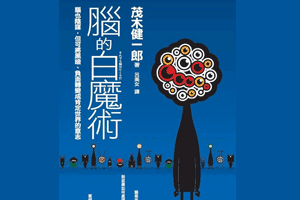The White Magic of the brain A cup of coffee in the morning, then a chocolate

Professional barista communication, please pay attention to coffee workshop (Weixin Official Accounts cafe_style)
Author: Kenichiro Mogi
No matter how hard one's life is, as long as one does not lose the enthusiasm of "living," there will be no big problem. In contrast, if you lose enthusiasm for life, brain activity will become sluggish. Kenichiro Mogi cites his own experiences and examples of the growth of celebrities from all walks of life, such as famous animation director Hayao Miyazaki, Japanese chess celebrity Yoshihari Hamato, Nobel physics winner Hideki Yukawa, famous funny artist Matsumoto, etc., to show the many aspects of the brain's intentions, provide the best way to activate the brain, and lead readers to show "the white magic of the brain"!
When it comes to the best hours to work, many people ask: Is morning work good? Is it better to work at night? Personally, I'm definitely a morning person. Because there are all kinds of dinner parties in the evening, I always enjoy beer and wine, trying to forget about work and relax. When I get home, I usually try to go to bed early and get up early the next morning to work. This is my favorite lifestyle.
I get up at 6 a.m. when I have to, sometimes at 4 a.m. or even 3 a.m. when I work more, and wake up with coffee and a blog, and then I start my day. Although it was early in the morning, the crows in the woods near my home had already started singing together, and the crows 'chorus was used as background music to start work. I was very happy.
Why not work in the morning instead of at night? I think it's because after a good night's sleep, your memory is organized and your mind is ready for new ideas. Moreover, from evening to late night, the memory system of the brain accumulates a lot of vague information, which makes it difficult to concentrate on innovative things.
Recent brain science research has also confirmed that brain activity continues during sleep at night, while experiences accumulated in brain circuits during the day are usually organized during sleep, and dreams are one of the phenomena of organization. Even when not dreaming, the brain compares and links recent and past memories, referencing each other and storing information. That is why we can judge the true meaning of things.
The morning thoughts are the fruits of the memory of the night, and when they are condensed into many ripe truths, they wait for the harvest. That is why I choose to work in the morning. This isn't the only way to work, because our brains are such a complex organization that it's dangerous to make judgments based solely on what we see. And brain activity varies from person to person, and what is good for one person may not work for others.
Yoshio Nakano (1903 - 1985), an Englishman famous for his translations of Shakespeare and Mark Twain, is said to enjoy working at night. After drinking with his students until midnight, he would suddenly say,"Excuse me, my classmates." Then he returned home and began to concentrate on translation. This style is quite suitable for the handsome Mr. Nakano.
Sometimes I have to continue working after dinner because of tight deadlines, but there is always a feeling of "reluctance", and I will naturally fall into "Why do I have to do this?" "The trouble. Of course, I still had to examine my work professionally and try to keep my mood at work as good as possible.
I think I'm better suited to working during the day. No matter how short sleep, as long as it is morning, will work hard without complaint, so set the completion time in the morning, is a happy thing.
Yasushi Machita, the writer I met on BS Japan's "Corridor of Neurons," was also a morning worker. His first novel was Big Black of Nanki (published in 1996), his novel Broken won the Akutagawa Literature Prize in Japan, and in 2005, his novel Confessions won the Tanizaki Junichiro Prize. His works received high praise and he is one of the representative writers in Japan. His unique rhythmic style of writing breeds indescribable charm, and it is said that Machida's day's work ends at 10 a.m. Then go do what you like.
I have a habit of working in the morning: never lack coffee and chocolate.
For a long time I drank filter cup coffee, but recently switched to espresso brewed by the coffee machine. As long as the coffee is in my mouth, the aroma and taste of coffee can wake my body and mind, and then the mood and atmosphere of wanting to work are brewed.
It is also important to replenish the sugar needed to keep the brain active. Because when I "eat chocolate happily," my brain releases dopamine, which has a very positive effect. Dopamine, released from the frontal lobes, activates the brain as a whole, acting as an infrastructure for work.
Of course, coffee and chocolate alone are not effective. Some people like to drink green tea and eat scallops in the morning before starting work. This is also a very normal habit. The brain does not operate purely because it senses individual differences rather than a simple organization produced by consistent operations.
For example, I choose to get up early to work, mainly from my own life experience and master the working methods. It is ideal for everyone to work according to their own preferences.
Philosophers who live in Kansai and whom I respect are told that they sometimes drink a little when they write, certainly not to the point of being drunk, but they say that when they are a little drunk, they write more smoothly.
With a dubious mood, I tried to read these people's articles and found that they were really as plump as boiled soybeans, but also with a soft feeling. I was surprised to finally accept the term "late drink" style.
Yoshio Nakano may have used the same secret to do his job.
What I write is still morning style, watered with coffee and chocolate. In fact, all methods have to be tried to know whether they are good or bad. Maybe I will try to write a drunken style article one day...
Important Notice :
前街咖啡 FrontStreet Coffee has moved to new addredd:
FrontStreet Coffee Address: 315,Donghua East Road,GuangZhou
Tel:020 38364473
- Prev

Is it more healthy to drink moderately roasted coffee? Is deep roasting coffee healthy? Which baking degree can store the most antioxidants?
Professional barista communication Please follow the coffee workshop (Wechat official account cafe_style) for consumers, they may not need to know the details of the baking process, go directly to the store shelf to take a bag of cooked beans and go home; if you are more advanced, go to a small nearby cafe and talk to the boss (usually the boss is a good baker).
- Next

You want a hangover? May drink coffee, help protect the liver, reduce alcohol damage to the liver
Professional barista communication, please pay attention to coffee workshop (Weixin Official Accounts cafe_style) hangover drink what can hangover? The answer is coffee. Coffee not only refreshes, but may also help protect the liver and reduce alcohol damage, research has found. Coffee is known to help refresh the mind, but foreign studies have found that drinking coffee after drinking can also offset some of the effects of alcohol on the liver.
Related
- The ceremony is full! Starbucks starts to cut the ribbon at a complimentary coffee station?!
- A whole Michelin meal?! Lucky launches the new "Small Butter Apple Crispy Latte"
- Three tips for adjusting espresso on rainy days! Quickly find the right water temperature, powder, and grinding ratio for espresso!
- How much hot water does it take to brew hanging ear coffee? How does it taste best? Can hot water from the water dispenser be used to make ear drip coffee?
- What grade does Jamaica Blue Mountain No. 1 coffee belong to and how to drink it better? What is the highest grade of Blue Mountain coffee for coffee aristocrats?
- What are the flavor characteristics of the world-famous coffee Blue Mountain No. 1 Golden Mantelin? What are the characteristics of deep-roasted bitter coffee?
- Can I make coffee a second time in an Italian hand-brewed mocha pot? Why can't coffee be brewed several times like tea leaves?
- Hand-brewed coffee flows with a knife and a tornado. How to brew it? What is the proportion of grinding water and water temperature divided into?
- What is the difference between Indonesian Sumatra Mantinin coffee and gold Mantinin? How to distinguish between real and fake golden Mantelin coffee?
- What does bypass mean in coffee? Why can hand-brewed coffee and water make it better?

